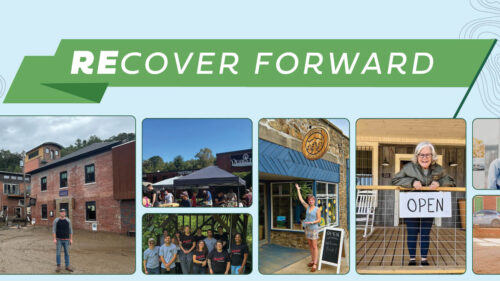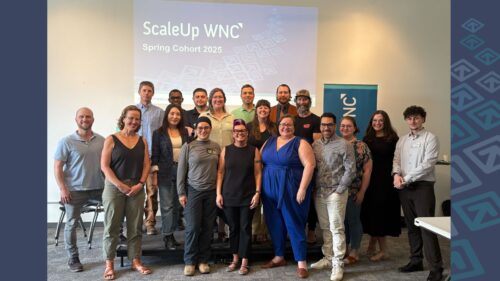James Little originally moved to Asheville to make custom bicycle frames. As a musician, though, he saw the potential in the aluminum materials he worked with every day: a more consistent, durable instrument that never changes with temperature, humidity, or a bumpy ride. Thus, Aluminati Guitar Company was born.
Innovative Beginnings
“I used to be a guitar player lifetimes ago,” James said. “All of my instruments would always fall out of tune.” He wanted to be ready to play a show – even in the often unpredictable Chicago weather. A friend had an old guitar with an aluminum neck that sounded great, but was very heavy, overly cumbersome, hard to play, and had tuning instability issues.
Fast forward a few years, and James moved to Asheville to work at Industry 9 – a manufacturer that makes bicycle components. Hanging out with their senior engineer, James asked if he could help him make something better: a guitar of carbon fiber and aluminum that plays exactly how a guitar should, but doesn’t ever change with temperature or humidity. He said yes.
A few weeks later, the engineer comes back to him with an instrument. James held what would become the first Aluminati guitar in his hands. It sounded perfect. “I played hundreds of shows with that guitar,” James said.
A Loan and a Shift
With proprietary instrument design locked in, James started building the first generation of Aluminati guitars in 2009 – from his home kitchen. “I didn’t have a CNC machine,” he explained. “I was contracting the parts to be made, and I would then put them together at my house, which took forever.”
This worked for his start, but, to grow, he needed support. In 2019, a friend told him about Mountain BizWorks, saying, “If you have a decent idea, maybe they could help you.”
The initial meeting, which included manufacturing specialist Robert Anoff, went smoothly. “When I opened up the guitar case, they saw the precision and everything that went into it,” James said. “Robert told me, ‘If you want to do this, you should just do it.’” He secured a small loan and quit his day job the very next day.
Building through Challenges
In those early days as now, he takes pride in making the instruments musicians need. Aluminati’s customers include both touring and session musicians. “They’re hopping on flights. They’re throwing their gear in and out of planes, in and out of stadiums. Or it’s a studio musician who needs to be ready at a moment’s notice,” James explained. “Our instruments allow them to be consistent. To play the show you came to see.” They also make aftermarket guitar necks that fit into an industry-standard FMIC neck pocket. It bolts right in, allowing easy customization for those that want it.
As with many businesses, the pandemic brought new challenges. When James found Aluminati’s current location, he secured a larger loan and began hiring. Then, COVID-19 emerged. He worked by himself in the new space for eight months. “I was alone, just trying to crank orders out,” James said. “I got them all out on time; I don’t know how.” This kept the business going until vaccines emerged and he could start building his team again.
Current Successes
Since then, Aluminati has grown with intention. James began hiring people – growing very slowly. Their now ten employees create electric guitars and basses under their brand. One way they’ve expanded in recent years is by creating instruments for other companies as an Original Equipment Manufacturer. “We actually build more guitars for other companies than we do of our own,” he shared. “It’s very cool.”
James shared a great example of this kind of cooperative manufacturing. “I came into the office, hit play on messages, and heard a gentleman say, “This is Chris Veleno, I’m looking for James Little, please call me back. That was it,” James laughed.
That call was from the son of John Veleno, who started the world’s first all aluminum guitar company of the same name. “When I called him back, he was the nicest guy,” James said. “He said they’d done their due diligence, and they still own all their trademarks, and ‘we would really like to resurrect our father’s legacy and start building these again.’” He asked James if his company would be interested in making them. “It was a full circle moment – the reason why I do what I do,” James said.
Playing for the Future
Mountain BizWorks’ ScaleUp program helped James and team explore more possibilities. “From an educational standpoint, ScaleUp was massive – it helped us see the bigger picture possible,” James said. That larger picture includes the value of intellectual property, studying manufacturing gaps they could bring in house. “Mountain BizWorks is the reason,” James said.
Now, Aluminati is raising capital to expand their facility, with plans to hire more local staff to grow their global influence through high-end American manufacturing rooted in WNC. Their commitment to progress – better products, exquisite craftsmanship, and love of community – continues. Post-Helene, they’re taking salvaged wood from the flood to create instruments and donating portions of the proceeds – and instruments – to location organizations. “It’s a way to take something awful and turn it into something beautiful and sustainable,” James said.
“The company has evolved over the years, and will continue to do so. We just keep innovating,” said James. “And I feel like I’m in a town full of all the help for entrepreneurs that you could ever have.”
To learn more about Aluminati Guitar Company, visit aluminatiguitars.com.
Images courtesy of Aluminati Guitar Company.




